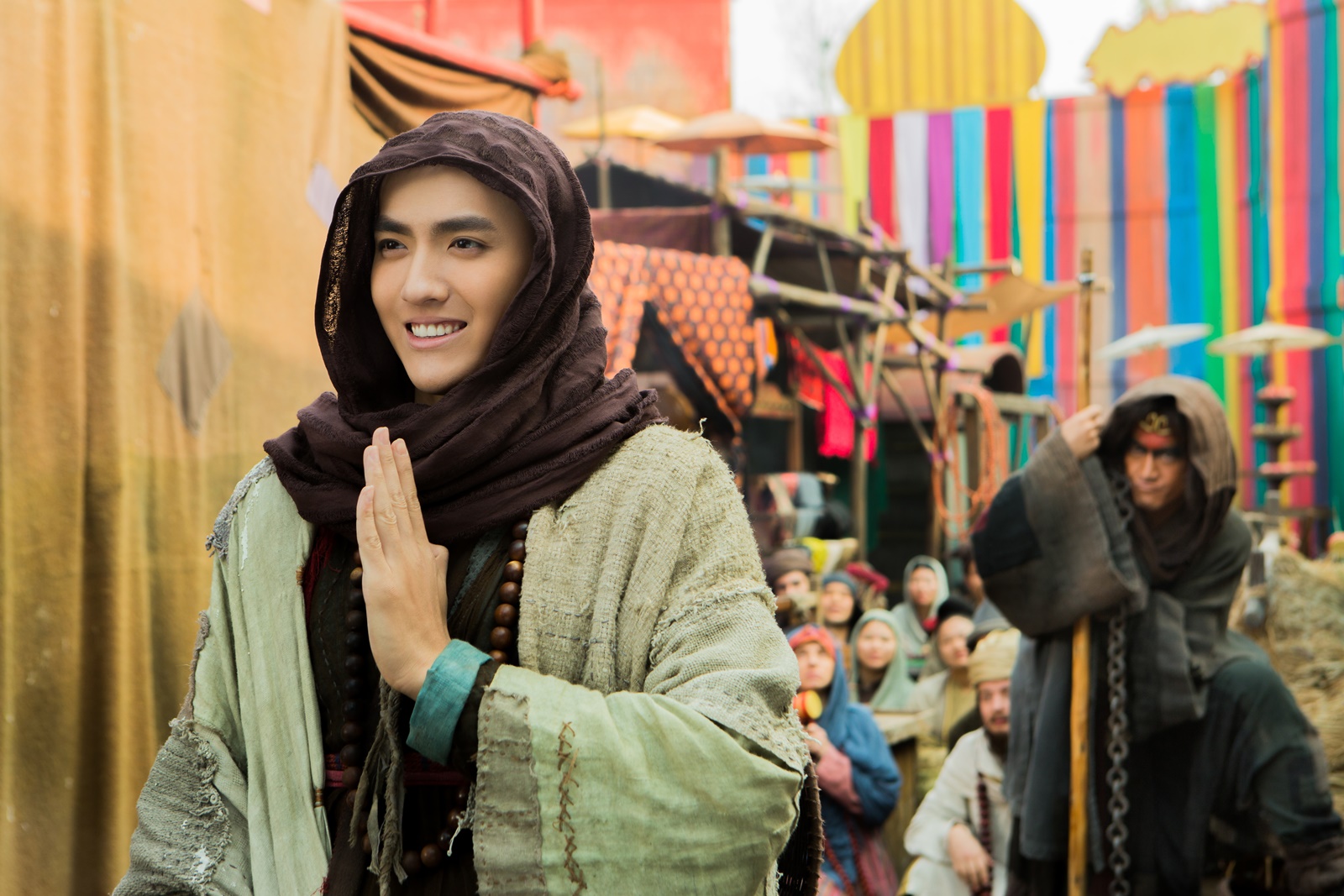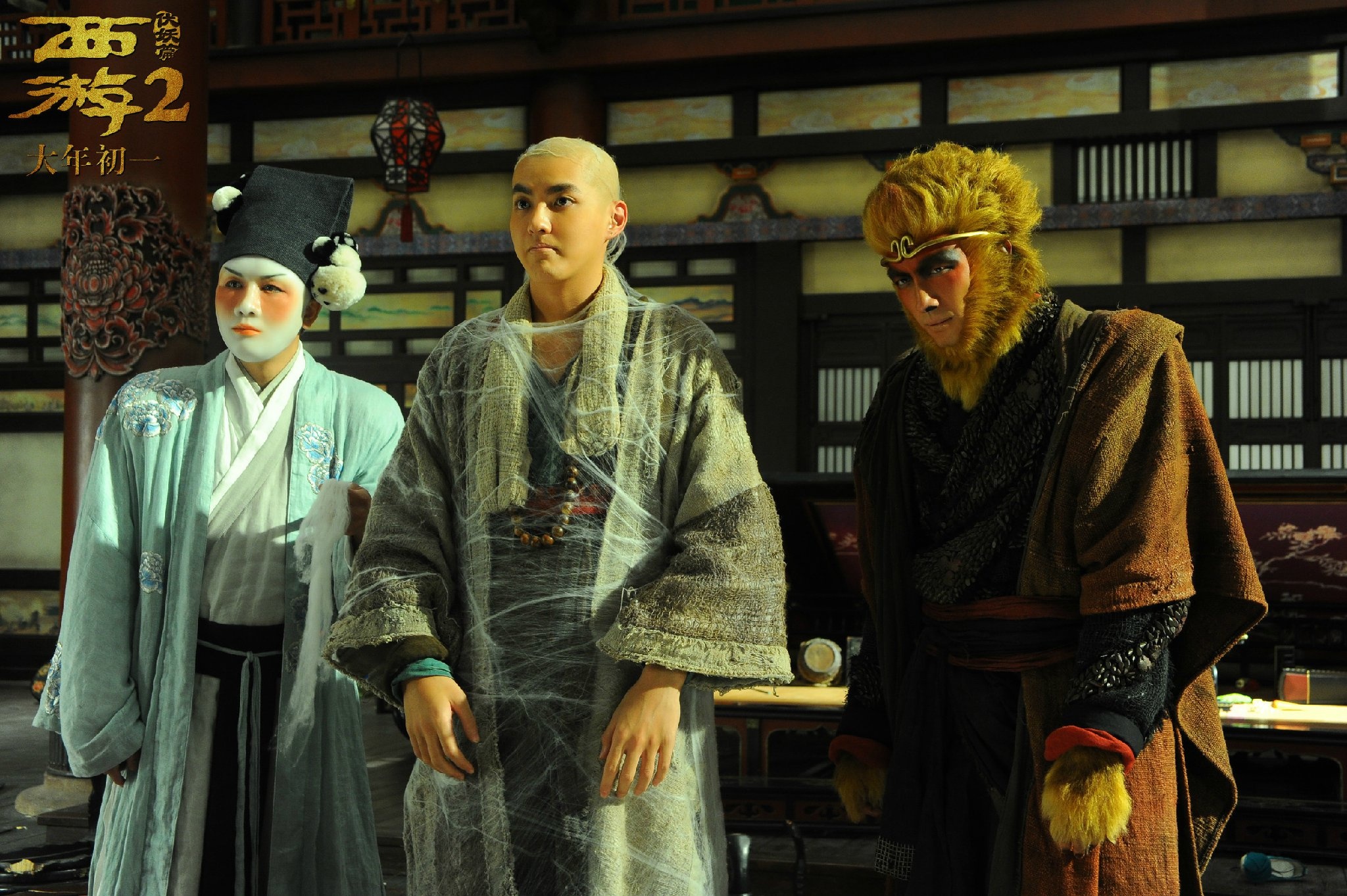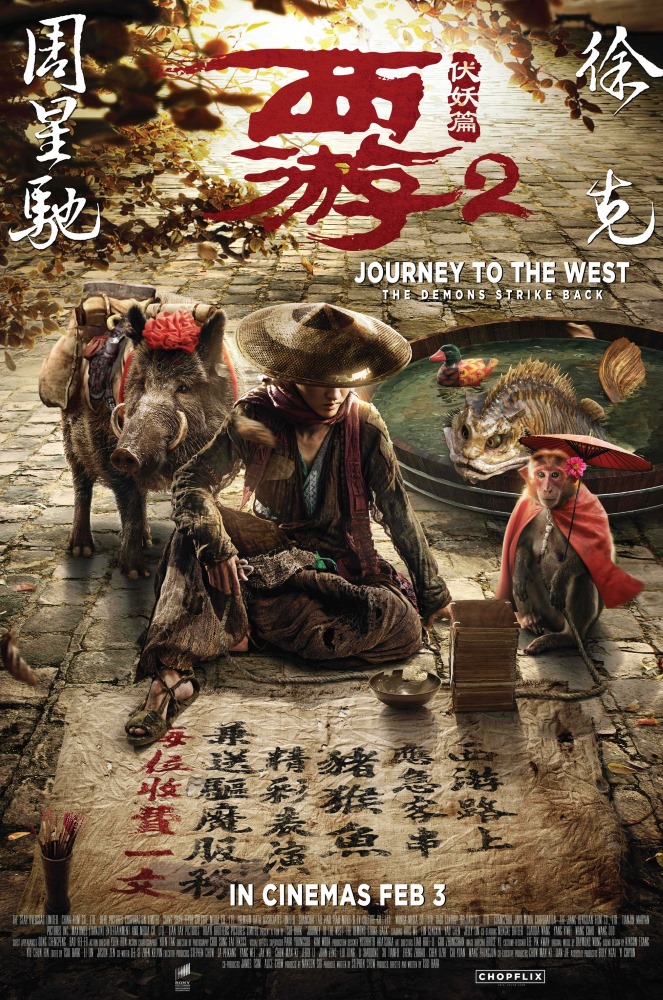aka Journey to the West: The Demons Strike Back
China. 2017.
Crew
Director – Tsui Hark, Screenplay – Stephen Chow, Lee Si Zhen Kelvin & Tsui Hark, Producers – Stephen Chow, Nansun Shi & Tsui Hark, Photography (3D) – Choi Sng Fai, Music – Raymond Wong, Visual Effects Supervisors – Kim Wook & Park Young Soo, Visual Effects – Mofac & Alfred Prosthetic Makeup Supervisor – Liu Ji, Production Design – Yoshihito Akatsuka. Production Company – The Star Overseas Limited/China Film Co, Ltd./Hehe Pictures Corporation Limited/Xiang Shan Zeyue Culture Media Co., Ltd./Premium Data Associates Limited/Shanghai Tao Piao Piao Movie & TV Culture Co, Ltd./Wanda Media Co,. Ltd./Dadi Century (Beijing) Co., Ltd./Guangzhou Jinyi Media Corporation/Zhe Jiang Hengdian Film Co., Ltd./Tianjin Maoyan Pictures./Maxtimes (Tianjin) Entertainment and Media Company./Lian Ray Pictures/Huayi Brothers Pictures Limited.
Cast
Kris Wu (Monk Tang), Lin Gengxin (The Monkey King), Yao Chen (Minister), Jelly Lin (Felicity), Mengke Bateer (Sandy), Yang Yiwei (Pigsy), Bao Beier (The King), Shu Qi (Duan)
Plot
Monk Tang continues his journey to the West, accompanied by The Monkey King, Pigsy and Sandy. In between fighting demons, they are forced to perform in towns in order to earn provisions for the journey. Monk Tang is finding the Monkey King increasingly more difficult to control. They come to the city of Bi Qui ruled over by a child king who petulantly demands that everything be arranged for his entertainment. They are banished after Monkey’s mischievous exploits go awry but Monkey sees that the king is really a demon and insistently returns to fight him. In reward for combating the demon, the real king gives Monk Tang the concubine Felicity as his companion. Monk Tang sees his lost love Duan in her, but Monkey insists that she is a demon despite all evidence otherwise.
Journey to the West: Conquering the Demons (2013) was a reasonable hit for Stephen Chow. An adaptation of the 16th Century Chinese legend Journey to the West, which has been filmed multiple times – see below – Chow spun the story through his usual bent for frenetic slapstick comedy. This is a field in which Chow had proven himself a comic genius in the past with films that he has directed/starred in such as From Beijing with Love (1994), Forbidden City Cop (1996), Shaolin Soccer (2001) and Kung Fu Hustle (2004). On the other hand, Conquering the Demons failed to work with the inspiration that Chow’s earlier films did – it can be seen that his work of the 2010s, at the same time as his work rises to all-time popularity at the Chinese box-office, has become bloated and not that funny.
Journey to the West: Demon Chapter is a sequel. While Conquering the Demons acted as a prelude to the saga, this brings the series more in line with the traditional adventures in Journey to the West. Here Stephen Chow has stepped back from directing, although co-writes the script and produces.

Chow has given the directorial chair to Tsui Hark, one of the legends of Hong Kong cinema. Tsui essentially created the flying swordsman genre with Zu: Warriors from the Magic Mountain (1983) and has directed and produced numerous other works (see below). It is a surprise that Tsui and Chow have not worked together before, although Tsui did make a cameo acting appearance in Chow’s last directed film The Mermaid (2016).
Tsui Hark and Stephen Chow make for an uneasy mix. Tsui delivers one of his usual films, filled with wildly over-the-top fantastique moves. There are some eye-catching sequences – a battle between the party and a household of women transformed into spider beings; the slapstick nonsense around the throne room of Bi Qui, climaxing in a battle with a series of sinister clockwork creations that look like they have stepped out of a Tim Burton film and a sky filled with hundreds of flaming horses alongside a palace that is torn out of the ground and levitated up into the air. The film reaches an especially epical climactic battle with the Monkey King transformed into a giant ape made of rock that is cracked open to reveal veins of lava inside, fighting off the Golden Vulture and tearing mountains up from the ground as multiple Buddhas appear, creating massive tidal waves.
On the other hand, while this results in a much more fantastical film that Conquering the Demons, having to take on board Stephen Chow’s slapstick tone makes for a very silly Tsui Hark film. Chow’s brand of comedy that plays on frenetic slapstick and simple-minded caricatures (not to mention poking laughter at fat and ugly people) is not something you ever find in any of Tsui’s other films. The plot is also on the episodic side. Moreover, the film suffers from the problems that beset much modern Chinese-made fantasy and that is that an incredible amount of money is lavished on the sets and costuming but the CGI effects look very obviously like CGI effects.

Tsui Hark’s other genre films as director are:- The Butterfly Murders (1979), We’re Going to Eat You (1980), Zu: Warriors from the Magic Mountain (1983), Aces Go Places III: Our Man from Bond Street/Mad Mission III: Our Man from Bond Street (1984), Green Snake (1993), Butterfly Lovers (1994), Zu Warriors/The Legend of Zu (2001), Black Mask 2: City of Masks (2002), Missing (2008), Detective Dee and the Mystery of the Phantom Flame (2010), Flying Swords of Dragon Gate (2011), Young Detective Dee: Rise of the Sea Dragon (2013) and Detective Dee: The Four Heavenly Kings (2018). Tsui Hark has also produced A Chinese Ghost Story (1987), The Laser Man (1988), Roboforce/I Love Maria (1988), A Chinese Ghost Story II (1990), Swordsman (1990), A Terracotta Warrior (1990), A Chinese Ghost Story III (1991), The King of Chess (1991), New Dragon Gate Inn/Dragon Inn (1992), Swordsman II (1992), Iron Monkey (1993), The Magic Crane (1993), Swordsman III: The East is Red (1993), Wicked City (1993), Burning Hell in Paradise (1994), Black Mask (1996), A Chinese Ghost Story: A Tsui Hark Animation (1997), Master Q (2001), Vampire Hunters/The Era of Vampires (2002), Sword Master (2016) and The Thousand Faces of Dunjia (2017).
Other versions of Journey to the West include:- the Japanese film Monkey Sun (1940); the Chinese animated Princess Iron Fan (1941); the Japanese film Songoku: The Road to the West/The Adventures of Sun Wu Hung (1959); the Japanese anime Alakazam the Great (1961); the Chinese animated film The Monkey King: Uproar in Heaven (1965), which is the best adaptation of the story to date; a trilogy of live-action films from Hong Kong’s Shaw Brothers Monkey Goes West (1966), Princess Iron Fan (1966) and The Cave of the Silken Web (1967); the popular the Japanese tv series Monkey (1978-9); a South Korean tv series Journey to the West (1982); a Japanese tv series Journey to the West (1993); a Japanese anime tv series Monkey Magic (1998); the US tv mini-series The Monkey King/The Lost Empire (2001) starring Thomas Gibson; the Hong Kong tv mini-series The Monkey King (2002); Jeffrey Lau’s A Chinese Tall Story (2005); a Japanese tv series Saiyuki (2006), which had one film spinoff with Saiyuki (2007); the US-made Jackie Chan/Jet Li vehicle The Forbidden Kingdom (2008); the modernised Emperor Visits the Hell (2012); while not long after this was the CGI-heavy The Monkey King (2014) starring Donnie Yen and its sequels The Monkey King 2 (2016) and The Monkey King 3 (2018) with Aaron Kwok; and the Chinese animated Monkey King: Hero is Back (2015).


